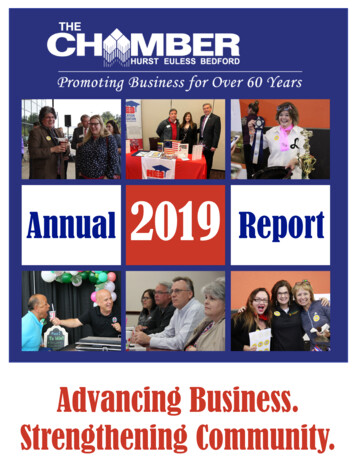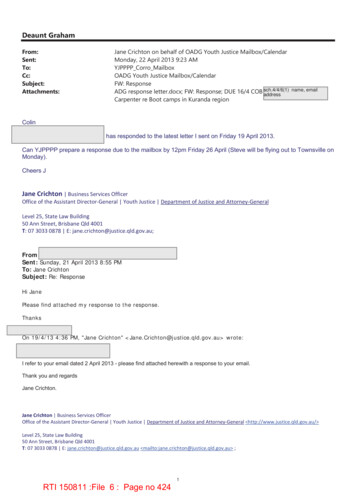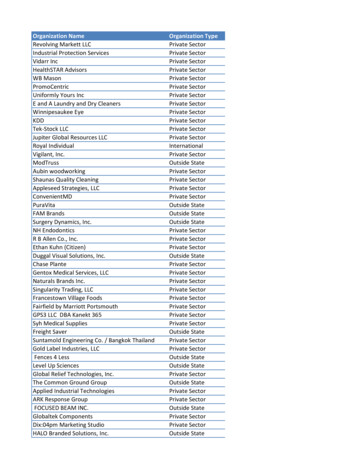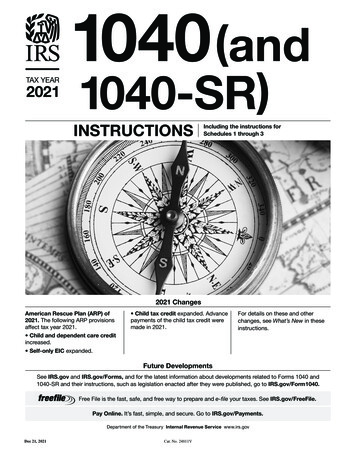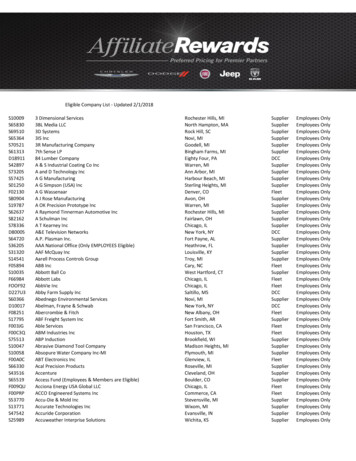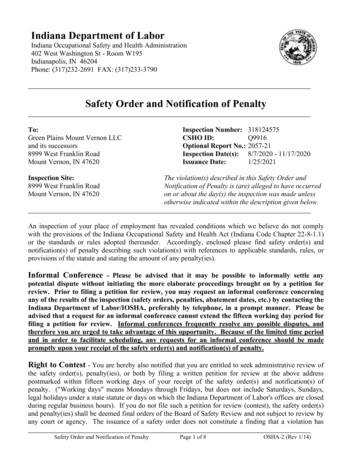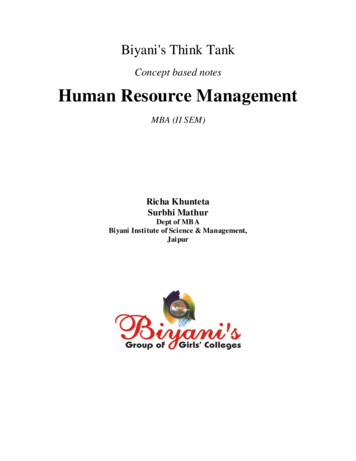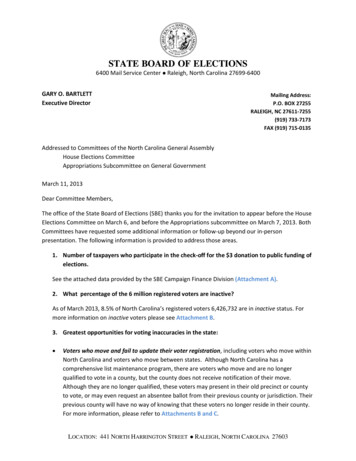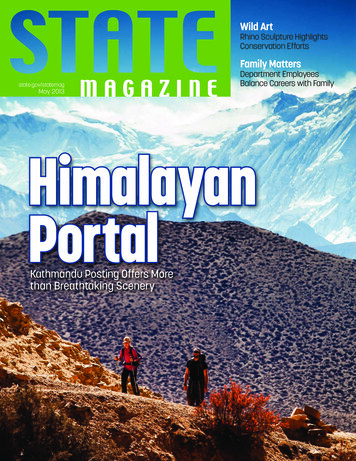
Transcription
Wild ArtRhino Sculpture HighlightsConservation EffortsFamily Mattersstate.gov/statemagMay 2013Department EmployeesBalance Careers with FamilyHimalayanPortalKathmandu Posting Offers Morethan Breathtaking Scenery
May 2013 // Issue Number 57826Unified TeamNationwide VisaFocus Cuts Backlogin BrasíliaDesigned by the late Brazilianarchitect Oscar Niemeyer, thefuturistic National Museumstands as a testament to hisarchitectural vision in Brasília’sCultural Complex of the Republic.Photo by Sylvain Bourdos
Features10 Promoting ResilienceDept. Programs Help FS Staff Bounce Back12 Success SecretsFamily Members Share Their Tips0614 Double DutyTandem Couples Balance Career, Family17 Eye-Opening ExperienceExchange Students Thrive Abroad18 Conservation MascotRhino Sculpture a Work of Many Hands20 Serenity and AdventureKathmandu Tour a Rewarding Experience28 Radio ActiveHaiti ‘Hams’ Aid in Emergencies30 Personnel RecoveryTraining Key to Handling Crisis SituationsColumns2 Post One183 Inbox4 In the News8 Direct from the D.G.9 Diversity Notes31 Safety Scene32 Active Years34 In Brief36 Retirements37 Lying in State38 Obituaries40 End State32On the CoverThe hills and mountains of Nepal are a nearlyendless source of leisure activities and inspiration. Photo by John Healey/jhph.asia
PostOneBY ISAAC D. PACHECOEditor-in-ChiefIsaac D. Pacheco // pachecoi2@state.govDeputy EditorEd Warner // warneres@state.govA Time forHealingOn April 6, Anne Smedinghoff,an information officer serving inAfghanistan, was among six Americanskilled when a suicide bomber detonatedan explosive device near the group asthey traveled by foot to deliver Dari- andPashto-language children’s books to aschool in Zabul province. Smedinghoffbecomes the first State Departmentcasualty directly related to OperationEnduring Freedom, the official title forthe war in Afghanistan that has claimedthe lives of more than 2,200 Americanssince 2001.Following the news of Smedinghoff’sdeath, Secretary of State John Kerry spokeabout the promising young diplomat,who had only two weeks earlier served as acontrol officer during his visit to post.“She was everything a Foreign Serviceofficer should be: smart, capable, eagerto serve and deeply committed to ourcountry and the difference she wasmaking for the Afghan people,” hesaid. “She tragically gave her younglife working to give young Afghans theopportunity to have a better future.”In fanatical, irrational acts of violencelike this one, the innocent are frequentlythe targets. The victims of this recentattack were trying to improve the livesof those who have been oppressed bytyranny, terror and corruption. They werenot sitting behind a desk talking abouthow to make the world a better place;they were out making it happen.Smedinghoff and her colleagues werein Zabul as part of an embassy-fundedprogram that, with the Afghan Ministryof Education, promoted literacy andprovided teacher training. To combatone of the lowest literacy rates in theworld, the U.S. Embassy has distributed1,920,000 books to 27 of Afghanistan's34 provinces and provided training forthe books’ use.2STATE MAGAZINE//MAY 2013Associate EditorBill Palmer // palmerwr2@state.govArt DirectorDavid L. Johnston // johnstondl@state.govContacting Us301 4th Street SW, Room 348Washington DC 20547statemagazine@state.govPhone: (202) 203-7115Fax: (202) 203-7142Change of AddressSend changes of address to our staffusing the contact information above.Please include your previousmailing address.In addition to those civilians andservice members killed in this attack,several others were injured, somecritically. Among those who sustainedserious wounds was Kelly Hunt, afriend of mine from the small, tightknit community of prior-servicemilitary journalists to which we bothbelong. A former Army photographer,Hunt was working for the Departmentas a public diplomacy officer inAfghanistan when she was struck byshrapnel from the blast.There is little that can blunt thebreath-robbing blow that news ofthis magnitude delivers, but I remainoptimistic that Hunt’s passion for life,which drove her to reach out and try tomake a positive difference in the lives ofothers, will also fuel her recovery. Shehas a long, arduous journey ahead, andat the time of publication remains incritical but stable condition. Her relativesand the families of the other victims ofthis attack remain in our thoughts.Email your condolences and wellwishes to us at statemagazine@state.govand we’ll publish some of them in anupcoming issue.SubmissionsFor details on submitting articles toState Magazine, request our guidelinesby email at statemagazine@state.gov ordownload them from state.gov/statemag.State Magazine does not purchasefreelance material.DeadlinesThe submission deadline for theJuly/August issue is June 17.The deadline for the Septemberissue is July 15.State Magazine (ISSN 1099–4165) ispublished monthly, except bimonthly inJuly and August, by the Bureau of HumanResources at the U.S. Department of State.It is intended for information only and isnot authority for official action. Views andopinions expressed are not necessarilythose of the Department of State. Theeditorial team reserves the right to selectand edit all materials for publication.Follow Us .com/statemagazine
InboxRome MarinesWe wanted to thank State Magazine for publishing theTri-Mission Rome article in the May edition that highlightedthe USO’s “Meet the Parents Program.” This annual USO initiative recognizes the outstanding work of two Marines from theTri-Mission Rome detachment and covers the costs of reunitingthem with their parents for a week’s vacation.After the article was published, American Airlines wasinspired to donate the flights for this year’s program winners,Sgt. Jomiah G. Price from Seattle, Wash., and Sgt. Jerome Jacobfrom the Federated States of Micronesia. We thank AmericanAirlines and USO Rome for their continued support of the U.S.Marine Detachment Rome.Michael P. VanniManagement InternU.S. Embassy in RomeFrankfurt MemoriesIt was fun reading your feature on Frankfurt (March 2012,pg. 20), my second Foreign Service post, in 1950. My wife andI were the first residents in the Carl Schurz Siedlung, livingon Jakob Leisler Strasse 9. Both of our children were born inthe 97th Army General Hospital which is now the AmericanConsulate General. Most of the city was still in ruins, yet therewas the beginning of a rich cultural life. I was the director of theAmerika Haus, the U.S. cultural and information center, whichat that time was the actual community center in the city. OurConsul General was Chetwin Montegue de Rinzy Piggott.Thank you for leading me along memory lane.Hans N. TuchForeign Service officer (Ret.)Birthday WishesCongratulations to State Magazine on its 65th birthday(February issue).I had the good fortune to edit State Magazine from 1996 to2004 when it evolved from paste pot to desktop, from blackand-white to color and from print to digital. The transitionwasn’t easy. It required the support of advisory board members,supervisors, editorial staff and readers.May you continue to prosper and be, as one senior diplomatonce described the magazine, that “warm welcome from home.”Carl GoodmanSignal Mountain, Tenn.@StateMagMention @StateMag in your official post or office tweets and getyour story out to the world! We’ll retweet the most interestingnews and feature items to our online followers and include the bestTwitter postings in upcoming issues of State Magazine!STATE.GOV/STATEMAG//STATE MAGAZINE3
In the NewsComics Connect with Indonesian YouthAt a comic convention (or comic-con) for comics aficionados inJakarta, the U.S. Embassy’s @america outreach effort celebrated itssecond birthday with Ambassador Scot Marciel, EAP Deputy AssistantSecretary Susan Stevenson, IIP Acting Deputy Coordinator CourtneyAustrian and more than 300 guests in attendance.The January 18 birthday celebration for @america, which hashosted more than 1,300 events for more than 260,000 visitors,reflected the comic-con theme in its title, @ameri-Con 2013, and ingame and toy displays. Attendees included comic writers and illustrators, plus English language experts and teachers. A back-flippingbreak-dancer in a homemade Transformers costume won the costumeplay (or cosplay) competition.The convention had 12 separate events and hosted more than 1,200participants over three days. Speakers included indie graphic novelistsJosh Neufeld and Jason Shiga; Indonesian comic book illustratorArdian Syaf, who draws for DC Comics and Marvel Comics; andDr. Naif Al-Mutawa, creator of a superhero book and animated TVseries based on Islamic faith and culture.In Indonesia, faith and fantasy are not contradictory impulses. Ayoung observant Muslim woman who belongs to a “Star Wars” clubengaged in a mock fight against imagined enemies using a light saber.American comic books and their fan-based subcultures offer persuasive narratives. Adji Widodo, who leads the Indonesia-U.S. Comic4STATE MAGAZINE//MAY 2013Book Readers club, said Indonesians love comic books “becauseeveryone needs a hero. Many American comic books emphasize heroicstories America introduces their values to other countries in a lightand easy-to-understand way.”“Commander” Hilmy Hasanuddin of the Indo Star Trek group saidhe believes “science fiction people contribute to the idea of the future.”Comic-con culture has become big business, and @americasupported the multibillion-dollar American movie and comic bookindustries by promoting their brands and icons. Promoting comic-conculture’s music, theme parks, clothes and toys supports the Americaneconomy in a fun, appealing way.The @america comic-con also reinforced the image of the UnitedStates as open and eager to share in what is now a world pastime.“We love our superheroes,” Ambassador Marciel told the nation’s topnewspaper. “They help us to dream, but also to fight for our values,the values of kindness.”Left: High school students at the convention display their copies of The 99comic book. Right: Comedian Fathia Saripuspita asks an audience at the eventwhy there are so few female superheroes.Photos courtesy of @america
DG Leads Recruitment Roadshow to TexasThe Director General of the Foreign Service and Director ofHuman Resources (DG), Ambassador Linda Thomas-Greenfield, leda team from the Bureau of Human Resources’ Office of Recruitment,Examination, and Employment (HR/REE) and the Bureau ofInternational Organizations (IO) on a recruitment trip to Austin, SanAntonio and Dallas, Feb. 26-March 1.The DG scheduled the visit to coincide with the first off-siteassessment of the Foreign Service Oral Assessment by the Board ofExaminers (BEX) to be done in six years at a Texas venue. Coincidingwith the assessments, the Hispanic Association of Colleges andUniversities (HACU) held its 10th Annual International ConferenceFeb. 28-March 1 in San Antonio, and HR/REE organized a diversitycareer networking event (DCNE) for regional candidates. The DGvisited the San Antonio assessment center, where she met the day’s sevensuccessful candidates, and participated in the HACU Conference andDCNE, with 240 attendees, where she engaged with motivated StateDepartment aspirants.The DG and her team held a workshop in Austin for 37 careeradvisors from 12 Texas universities to update the advisors on Statecareers, internships and fellowships. Later, she told a University of Texas(UT) gathering on “Diplomacy in the 21st Century” how moderntechnology and social media are changing diplomats’ work.In San Antonio, the DG spoke to a standing-room-only audienceat St. Mary’s University, whose student population is 71 percentHispanic. At least 17 serving FSOs and six Civil Service employees inthe Department are alumni of St. Mary’s. The roadshow ended witha visit to the Dallas Passport and Diplomatic Security (DS) offices.At the latter, the DG presented a plaque for 30 years of service toVanessa E. Winins.Accompanying the DG on the trip were Kaara Ettesvold, DerwoodStaeben, Kathleen Eagen, Jessica Norris and Anjoly Ibrahim of HR/REE, and Courtney Johnson of IO, who recruits American citizens forpositions with international organizations. The team was joined in Texasby San Antonio-based Bryan Hykes of DS, UT Pickering Fellow ShirleyGreen and Diplomat in Residence Julie Connor.Dr. Antonio Flores, president of the Hispanic Association of Colleges andUniversities, discusses Hispanic recruitment with the DG in San Antonio.Photo by Studio FuzedIRM Releases Online Collaboration ToolA new resource called The Current, from the KnowledgeLeadership Division of the Office of eDiplomacy in the Bureau ofInformation Resource Management, enables domestic and overseasOpenNet users, including USAID staff and interagency ForeignAffairs Network users, to display information from sources inside andoutside the Department of State in a single website.The Current is being used to track breaking developments such as arefugee crisis or a natural disaster, and to follow long-running matters,from leadership studies to think tank reports. Within days of itslaunch, The Current had more than 7,000 users from the Departmentand 220 posts. A sort of online briefing book, The Current is availablein a standard version that provides “global” pages with informationsuch as ALDACs and Department news on external social media.There’s also a customizable version that lets users of Corridor, theDepartment’s in-house networking service, create 10 additional“personal” pages, drawing on as many as 90 additional sources of theirchoosing. The Current’s collaboration feature enables users to sharepages and news items with colleagues via email, Corridor or relevantCommunities@State.Deputy Chief InformationOfficer Janice Fedak saidthat “if an item interestsyou, it should interest yourcolleagues—so share it, talkabout it, expand everyone’sperspectives about developments that matter.“Whether you’re new to a job or a seasoned employee, there’s oftentoo much information to digest and it’s scattered in so many differentplaces. The Current can help you get a handle on that and then discusswith your colleagues what that information means to our foreign policyand our diplomatic statecraft,” she said.“The Current is a clean and intuitive way of visualizing otherwisedisparate news sources,” said Gregory Maly of the Bureau of Conflictand Stabilization Operations.Stephanie Bowers of the Bureau of Democracy, Human Rights andLabor said The Current can put “thematic issues tailored to my office’sinterests on one page. It’s a significant timesaver and doesn’t clog upmy already full inbox.”
Mission Promotes Health, Education in NigeriaThrough the opening of a rural clinic and a partnership with anewspaper, the U.S. Mission in Nigeria earlier this year promotedhealth and education in its host nation.The education effort had the public affairs section of the U.S.Consulate General in Lagos partnering with the publication This DayAbove: Dehab Ghebreab, public affairs officer at the U.S. Consulate General in Lagos,left, listens as This Day’s Editor-in-Chief, Nduka Obaigbena, talks to students. Photoby Consulate General Lagos; Below: Women in a village south of Jos, Nigeria, dancein a welcome ceremony for U.S. Consulate General staff. Photo by Brian Williamsto host a youth education outreach program for students, who learnedabout Internet educational resources and U.S. Mission educationalservices such as EducationUSA. Former President Bill Clinton gave aspeech and 15 teachers received awards at the February event, whichrecognized prominent Nigerian educators and was attended by morethan 1,500 people, including notable public figures, governmentofficials, traditional leaders and 300 students.“Economic power will go to those who maximize the opportunity of education,” said Clinton, who shared stories about teacherswho influenced his life.A month earlier, staff from the U.S. Embassy in Abuja traveledto Tokbet for the opening of the Tokbet Community Clinic, whichwill serve up to 15,000 inhabitants in this remote area, providingmaternity care, prenatal checkups, HIV/AIDS testing, counselingand treatment.Construction of the clinic involved a partnership of the TokbetCommunity Development Association and the U.S. Mission’sSmall Grants Program.At the opening, Deputy Chief of Mission James P. McAnultydescribed how the Small Grants Program can be used to supportbroader U.S. foreign policy aims, such as implementation of thePresident’s Emergency Plan for AIDS Relief. For more than twodecades, Mission Nigeria, through the Ambassador’s Small Grants andSpecial Self-Help programs, has partnered with NGOs throughoutNigeria to fund small community-based development projects thatpromote sustainable development and improve living conditions.Projects have included construction of classrooms, health clinics andcommunity centers, and provision of food processing mills, boreholes,latrines, textbooks, classroom furniture and laboratory equipment.
Indonesian University Interns Help ConsulateWith limited staff and growingpersonnel needs, the newlyconstructed U.S. ConsulateGeneral in Surabaya, Indonesia,partnered with local universitiesin 2012 to create a series ofinternship programs that rotateIndonesian university studentsthrough several consulate sections.After pitching the idea to alocal university’s president, thechair of its Business InformationSystems Department andinformation technology students,the post hired two interns for asix-month rotational program.The students troubleshot systemsissues, installed new hardware andsoftware, updated the SharePointsite and edited consulatephotographs and videos. Theyalso provided technical know-howand subject-matter expertise tothe public affairs section (PAS) forsocial media initiatives.According to Public AffairsOfficer Andrew Veveiros, “UsingIndonesian college students to runour Facebook site gives uniqueinsight, as the interns represent our target group—young Indonesianstudents and future leaders. Without interns, PAS would not be able tobe as effective as we would like.”The students benefit, too: They get to work in an Americanenvironment, hone their English language skills and become morecompetitive in the global market. So far, five interns have rotatedthrough the information resource management, public affairs andpolitical-economic sections.In the political-economic section (P-E), which has seen a significantincrease in travel, representational events and reporting, the threeLocally Employed Staff have portfolios that cover a broad range oftopics and an immense geographical area. Therefore, “We were desperatefor any help we could get, and our first intern has proved this programis extremely valuable,” said P-E Officer Michelle Morales. The intern,Local college intern Hanan J. Basyarahil shows Information Program OfficerMaurizio Visani a promotional video she created for the consulate.Photo by Didik B. Wicaksonowho is studying international affairs, helped compile data for the 2012Trafficking in Persons Report and helped organize a major representational event promoting religious tolerance and honoring Martin LutherKing Jr. and former Indonesian President Abdurrahman Wahid.The internship program maximizes resources in a tight budgetclimate and addresses Mission Indonesia’s long-term strategy ofcreating educational partnerships between the United States andIndonesia, since people-to-people ties made through educationpromote a solid bilateral relationship.Visa Seeker Gives Birth at Embassy LondonWaiting in the visa line at the U.S. Embassy in London, a pregnant woman who’d traveled 100 miles by train to get there began having contractions. Local guards Tara Porter and Jamie Stockwell alerted the medical unit, which called an ambulance, and Assistant Regional Security OfficerEric Ros helped escort the woman and her son through security to the medical unit.The paramedics arrived after 45 minutes, but seeing that the patient was in good hands and too far along to be transported, they allowed Dr.Larry Padget, Marlene Kleven and Linda Van Leuven to deliver a healthy baby girl. The new baby and her mother were transported by ambulanceto a London hospital and were discharged the following day.Although the post’s medical unit is unequipped for childbirth, its staff gave the laboring woman oxygen, found extra heating, lighting andmedical supplies and even fashioned a makeshift bassinet from the baby scale. The housekeeping staff delivered extra linens and the administrative assistant entertained the woman’s son in the waiting room.“While the nurses were doing the real work of cleaning up, I was drinking tea and receiving ‘attaboys’ and ‘well done’ from my friends andcolleagues around the world,” said Dr. Padget, the regional medical officer in London.The mother returned to the embassy later to renew her son’s passport, the task that had first brought her there. She brought her new babyalong for all to see.STATE.GOV/STATEMAG//STATE MAGAZINE7
Direct fromthe D.G.LINDA THOMAS-GREENFIELDDIRECTOR GENERALPreventing and ResolvingWorkplace ProblemsAre you facing, or being accused of,bullying, threats or intimidation? Doyou feel like you are in a hostile workenvironment? Are your work assignments and/or schedules unreasonable?Are you a supervisor or manager withemployees who must work togetherbut don’t get along? Is a difficult coworker holding your office hostage?Are you in a conflict and just not surehow to handle it?Each and every employee of theState Department is far too importantto be stressed by unresolved issues inthe workplace; therefore, if you areexperiencing any such non-EEO-basedconflicts, I strongly encourage you toreach out to the Office of the Ombudsman, in Room 7330 of the HarryS Truman Building. The Office of theOmbudsman is open to all Department employees—whether they areCivil Service, Foreign Service, LocallyEmployed Staff or contractors.Led by Shireen Dodson, the Officeof the Ombudsman offers traditionalombuds services such as conflict coaching and facilitated conversations, andhas recently opened its WorkplaceConflict Prevention and ResolutionCenter, which offers mediation, groupfacilitation, fact finding and peerreview panels. The center is committed to fostering a workplace culturethat proactively manages conflict andbenefits from innovative and creativeresolutions. Its mission is to provide avoluntary, neutral, independent and8STATE MAGAZINE//MAY 2013confidential program whereby employees can consensually resolve workplacedisputes and reach fair and quick solutions to workplace conflicts.Office of the Ombudsman personnelare selected for their positions based ontheir experience in mediation, conflictresolution and coaching, as well astheir interpersonal skills. They must bewelcoming, so that employees feel comfortable talking with them, and mustknow how to really listen to people andbe empathetic. They can help employees and managers understand how theyare contributing to conflicts, as well asgive co-workers skills to help them tocope with difficult colleagues.The center’s goals are:1) Provide an environment whereemployees and managers can presentissues in a nonthreatening forum,2) Forge better relations amongdisputing parties,3) Provide an impartial third partyto assist in identifying the causes ofwork-related concerns/issues and4) Help parties in conflict obtainmutually acceptable resolutions.First-time visitors to the Office ofthe Ombudsman can expect to participate in a “convening” conversation toclarify issues, identify stakeholders anddiscuss options for resolution. Fromthat meeting, a plan of action and nextsteps will be agreed upon. The officestaff tailor their response to the needs ofthe individuals who contact the office.If the conflict involves an individu-al, then Ombuds Services can facilitateconversations and provide coachingand conflict resolution services. If theconflict involves more than one person, then the group may be directedto the Workplace Conflict Preventionand Resolution Center, which can provide fact-finding, peer review panels,group facilitation and mediation. IfOmbuds Services believes it is appropriate, it may refer that individual tothe Office of the Inspector General oranother suitable office.As federal workers, we are guardiansof the public trust and there are certain standards that we are all expectedto live by. We call upon all of you—supervisors and employees alike—toshow integrity, to adhere to the highest standards of ethical conduct and,when problems arise, to resolve themat the core.For more information, please contact the Office of the Ombudsman viaemail at Ombudsman@state.gov, or viaphone at (202) 736-7144.
DiversityNotesJOHN M. ROBINSONOFFICE OF CIVIL RIGHTSWhy Does DiversityMatter to Me?This question was most eloquentlyanswered by Department of Stateleaders commemorating the Rev. Dr.Martin Luther King, Jr.’s birthday onFeb. 5. For three successful years, theOffice of Civil Rights has emphasizedDr. King’s message of inclusionby hosting an event featuring theDepartment’s senior leaders discussingwhy diversity and inclusion areimportant to them.Past speakers have included UnderSecretary Maria Otero, Legal AdviserHarold Koh, Assistant SecretaryEsther Brimmer, Under SecretaryPatrick Kennedy, Executive SecretaryDaniel Smith and Director GeneralNancy Powell. Contributors such asAmbassador Barry Wells, Senior PolicyAdviser Judith Heumann, AmbassadorDavid Huebner, Deputy AssistantSecretary Marcia Bernicat, DeputyAssistant Secretary Daniel Baer andAmbassador Luis CdeBaca have alsotaken the time to share their storieswith us in the past.Each individual’s answer andaccompanying stories were unique.Under Secretary Otero shared thestory of her family, which was tryingto maintain its ancestral roots, whilealso trying to assimilate into U.S.culture. Audiences learned that theyoung Harold Koh switched his favoritebaseball player from Babe Ruth to JackieRobinson after a classmate convincedhim Jackie did everything Babe did,but did it while others wanted him tofail. Nancy Powell’s “aha” moment, themoment she realized that being differentis significant, occurred when she learnedshe could not coach high school footballbecause there were no facilities in thelocker room for women. We furtherlearned that Judith Heumann and herfamily had to fight against the publiceducation system so that she couldattend school. Ambassador CdeBacashared his father’s story of driving fromnorthern New Mexico to New MexicoState University, having to travelthrough dangerous territory where heconsistently feared violence in order toattend school.I frequently write and speak aboutthe crucial role of leaders in makingtheir commitment to diversity visible,specific, personal, and persistent. Partof that role includes leadership sharingtheir diversity stories with staff to showthat the commitment is personal andgenuine. Expressing a commitmentto diversity in personal terms is animportant way of communicating thestrength of that commitment to staff.People are the sum of theirexperiences, and each workplacebenefits from the diverse and variedexperiences of all of its employees. Itherefore challenge each office to setaside time for willing staff members toshare a diversity story or “aha” momentwith the rest of the team. The goal isnot to create a “kumbaya” moment forall involved, but rather to reveal thediverse skills and life experiences of theindividuals within the team. Considerusing this exercise during the next officeoff-site meeting. People want to workwith team members they know andwith whom they feel a connection. Youmay find some untapped skills or talentswithin your team that you never knewexisted. At the very least, you will bringpeople together, and team memberswill understand one another better. Theresults may surprise you.I applaud those leaders who havealready shared their personal storiesand invite others to do so duringfuture events. Their stories not onlydemonstrate their deep commitmentto diversity and inclusion at theDepartment, but they also definepivotal moments in their professionaldevelopment. I also applaud those wholisten and take the message to heart.The amount of positive feedback theOffice of Civil Rights has receivedfollowing each of these events has beenoverwhelming. All of the programs arearchived on BNET and are available forviewing at any time.STATE.GOV/STATEMAG//STATE MAGAZINE9
Spring is a time of rebirth andrenewal on the FSI campus.Photo by Sandra NiedzwieckiPromoting ResilienceDepartment Programs Help FS Staff Bounce BackBy Ray Leki, director, Transition Center, Foreign Service InstituteAs the Foreign Service community has moved in the past decadetoward a more expeditionary approach to diplomacy, personnel havebeen assigned to war zones and other dangerous areas. Beyond therisk to their lives, employees and family members sometimes facesevere stress and trauma, and can sustain damage to their careers, selfrespect, self-esteem, and relationships.Nonetheless, an extraordinary number of Foreign Servicecolleagues and family members who undergo devastating experiencesemerge undamaged and energized. Consider Kathleen Stafford, whorecently became famous when depicted in the Oscar-winning film“Argo.” A first-tour Eligible Family Member in Tehran in 1979, shesurvived the attack on the visa section of the embassy, lived in hiding10STATE MAGAZINE//MAY 2013and engaged in a bizarre escape. Later in her career, she underwentnot one but two evacuations.Despite this, she remains positive about her life and experiences, andbeguilingly flexible. During her last ordered evacuation from post, sheused the time to put on an exhibition of her art in Alexandria, Va.How is it that some people confronted with danger and disruptioncome out unscathed and even better for the experience? Canthis kind of resilience be taught? Can strategies for
an information officer serving in Afghanistan, was among six Americans killed when a suicide bomber detonated an explosive device near the group as they traveled by foot to deliver Dari- and Pashto-language children’s books to a school in Zabul province. Smedinghoff becomes the firs
